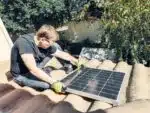
The solar energy industry continues to blossom as one of the biggest renewable energy industries, but just like any industry, there will be bad actors looking to make off with some quick money.
Scammers have been using the solar industry for years now, but as the industry continues to grow, the number of people who think solar is an attractive option for their homes also grows, emboldening scammers. Even if you are not considering solar right now, but still might in the future, being aware of the different ways scammers can take advantage of people is a strong defence against protecting you from being on the receiving end of a scam one day.
When we are talking about scams, it’s important that we distinguish between scams and bad investments. Solar is a big upfront investment, with the potential for paying itself off in years and saving you money in the long run. Not every home or yard will be suited for solar panels, based on factors including the direction the property is facing, size and angles of roofs, average sunlight your location receives, and beyond.
A bad investment could be going ahead with solar that your home or yard is not suited for, or getting overcharged for a functioning, supported solar system. A solar scam is an investment that was sold through dishonesty, manipulation or other practices, that had no chance of ever returning your investment.
The Scams
Reading from accounts of people who have been scammed, as well as advice from experts regarding how to avoid solar scams, there are a few different ways bad actors try to rip off potential solar customers.
- They might try to get you to sign a contract quickly, or under fraudulent pretenses.
- Potential customers are misguided by the benefits of solar: A scammer might oversell on how much they will be able to produce, mislead in how ideally their roof is suited for solar generation, and misconstrue government incentives and other programs.
- Customers are misled to sign a solar lease or power purchasing agreement under the guise of a “free solar” pitch.
- Installation might never even happen. This often is accompanied by the company ghosting you, leaving you with a headache.
There is a lot of misinformation out there regarding solar. While solar is an incredible resource and can be a sustainable source of electricity, it is a solution that will not benefit everyone equally. The architecture of your house, down to roof direction, angle, and size, are hugely constraining factors for rooftop solar, for example.

Red Flags
High-pressure sales tactics
There are lots of stories online about Canadians who do not know much about solar are getting pressured into signing the dotted line and getting ripped off with their solar installation. Either due to convincing marketing pitches, or outright lies and manipulation, people can be especially sensitive to high-pressure sales tactics when it comes to solar.
You might hear from a company that they have a short-term deal that you need to sign up for immediately to get the best deal. Or you might be offered a deal that’s too good to be true, like “free solar panels”. Whatever the method is, if the salesperson seems to be pushy, evasive, and not take no for an answer, it’s in your best interest to end the dialogue.
A lot of this comes down to how the customer is put into contact with the company. Door-to-door solar sellers have the worst reputation for potential solar scams, after companies like Sunwave Solar reportedly strung along numerous customers they got from going door-to-door.
Among many people, door-to-door sales of solar is a red flag. That is not to say that every company going door-to-door trying to pitch solar to customers is looking to defraud you. It’s a method of doing business that has many supporters. However, there is a feeling of apprehension that many have when they get a ring from their doorbell from a salesperson.
Provinces like Alberta and Ontario have made selling certain energy products door-to-door illegal to protect consumers, but these bills do not extend to solar sales as of right now. Keep in mind that every province in Canada has some kind of cooling-off period when it comes to direct agreements, so if you or someone you know does sign with a solar company, they have ten days to cancel the contract, for any reason.
Misleading Information
From the extreme end of the spectrum where companies promise free solar panels or a free installation without divulging the fine print, to the more mundane end where numbers are jumbled to make it look like you are getting a better deal, lying or miscommunicating about numbers is a huge red flag. However, this one is the hardest for someone who doesn’t know solar to pick up on.
Whether the inflated information pertains to the proportion of the energy bill you can generate yourself, or the cost of the equipment, you will need some kind of knowledge benchmark to compare with. If you get multiple quotes, you can compare each quote against each other to understand where you might be able to do better, or where you might be taken advantage of.
Any quote you receive from a solar installer should include a full inventory of the quoted equipment, including the make and number of solar panels that are going to be installed. Watch out for places where information that should be provided just isn’t.
Legal Fine Print Issues
Many solar companies offer their own in-house financing, with the basic intention, or at least appearance, of making solar more accessible. There are many different options that can help customers add solar to their homes and change their energy consumption to use a cleaner source of energy. While loans can help customers, there are other types of deals, such as leases and PPA’s that can be confusing for first-time solar customers.
Watch out for “third-party ownership” when it comes to solar – where another company owns the solar on your house, and you pay the company either a lease payment or for the electricity it generates.
While these deals can sound great – they can be done with little to no upfront costs, and are non-emitting sources of power for your home – there are a number of downsides that make these deals contentious for many. While a lease or power purchase agreement can feasibly save you money on your power bill, comparatively you will save less than if you buy your system outright, especially if you qualify for some kind of government incentive. You are also bound to a long-term agreement and the solar panels that are installed on your roof. This contract might charge you a leasing fee or stipulate a price to purchase the generated electricity at. Don’t like them? Too bad, you are stuck with them, and have to abide by the terms within the contract to get out of it, which might include buying the contract out. Wanna sell? Too bad, as homebuyers often do not want to take on the contract you signed as part of buying the house.
Dishonest companies might make big promises about the contract you are signing, only to hide behind the small print if you realize something is not right. We recommend to always read the fine print carefully before signing and even consulting a financial professional if you do not understand the terms and conditions.

How to protect yourself from solar scams
Knowledge is the most important thing you can have to protect yourself.
- Read the terms and conditions of everything you sign.
- Refuse any type of home inspection, review of your power bill, or any other invasive request by a door-to-door salesperson. Only give information to reputable companies.
- Look into online reviews about the company. If they are bad actors, there’s a good chance you are not their first target.
- Shop around. If someone comes to you with a great solar opportunity, you should see if other retailers or installers are offering similar – or even better – deals.
- If you or someone you know signs a door-to-door sales contract that raises flags, do not fear just yet. Every province in Canada will have a cooling-off period of 10 days, where you can cancel a direct sales contract for any reason.
To learn about other common electricity and natural gas scams, please check our full guide here.











